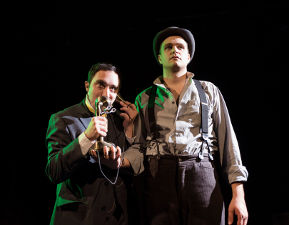
Beate Hein Bennett
| No
One Is Acquitted
April 19 – May 6, 2018 While the novel “The Trial” by Franz Kafka (1883-1924) has inspired numerous dramatic adaptations and performances since its posthumous publication in 1924—Kafka wrote it in 1914/15—Andrew Visnevski’s adaptation is presented as a US premiere and inaugural production by the new NYC company, Sextant Productions. It is a very timely choice, given the strange juridical climate presently prevailing in the United States, especially for DACA and other long-term illegal but working immigrants lingering in judicial limbo. (A side note: In 2013 the New Century Theatre in Seattle produced “The Trial” adapted by Kenneth Albers in a former INS immigration jail which housed deportees!) Kafka has been the pre-eminent literary godfather/prophet for the 20th century and, obviously, the play strikes a chord in our time. Josef K., the central character is subjected to “the trial” for a cause unknown to him. One morning, as he is getting dressed to go to work, two shadowy characters intrude upon him and inform him that he is to appear at court. His descent into the irrational underworld of power is told scene by scene-- grotesque, satirical, pathetic, and fantastic until his inevitable demise. Visnevski’s adaptation is economical and theatrical in that he maintains the central thrust of Josef K.’s encounters with the various emanations of power that entrap him—the brutal henchmen, the officious but ignorant inspector, the predatory bailiff’s wife, the powerless advocate Dr. Huld, and others. Josef K. is both actor and narrator, subject and object—he tries to maintain his identity as the ground beneath him shifts and time and places become an exhausting tangle. The small studio space of the Cherry Lane Theatre lends itself quite well to this dense script. Marek Pavlovski’s set design of moveable pieces, metal pipe frames, a file cabinet, a bed, a couple of chairs, allows the actors to change the spatial configurations without losing the fast pace. Miriam Nilofa Crowe’s lighting creates a variety of moods and sharply delineates each scene. Jeremy W. Floyd designed simple costumes evocative of Kafka’s period but with clever color accents that add a humorous eccentricity, for example Josef K.’s bright yellow socks and tie. Drigan Lee directed the work so “eerily relevant to our own turbulent moment” (his words) and shares with the ensemble of actors the task of playing multiple roles: he is one of the henchmen, colorful Titorelli, and the Bailiff. Isabella Knight, the spiritor rector of Sextant Production who had played with the original 1980 London cast in Visnevski’s adaptation and under his direction, plays three parts in this production—Dr. Huld, the impotent lawyer, the implacable Inspector, and a Priest-- all with subtle sly humor and impeccable clarity. Desiree Staples plays the various zesty female parts. Matt Kuyawa plays three very distinct male characters. Will Dagger as Josef K. carries the play; the part demands intensity and the actor has to be able to sustain the underlying innocence as well. The irony of his situation, being the accused while being innocent of any wrongdoing, emerges through the progressively more confusing and painful but also strangely funny interactions with the other characters. Andrew Visnevski wrote in a message to the Sextant ensemble, dated April 18, 2018: “When we first set out to bring this play to audiences in the United Kingdom 38 years ago…the response we had took us by surprise…the lonely path of the protagonist, the ‘sense’ made of nonsense by those he encounters, the very world in which one finds oneself lonely and helpless, and, last but not least, the humour, all struck a chord…and this was decades before the refugee crisis was even dreamt of. The world and one’s perception of it change all the time, as do artistic trends. But perceptive works of art, such as Kafka’s writing, endure beyond the transient and fashionable. I know that you will bring your own tender and contemporary experiences to this play and fearlessly create a palpable world in which your audience will live with you—and never forget afterwards.” I encourage the reader of this review to enter Kafka’s world
with this fearless new company.
|
| museums | NYTW mail | recordings | coupons | publications | classified |

